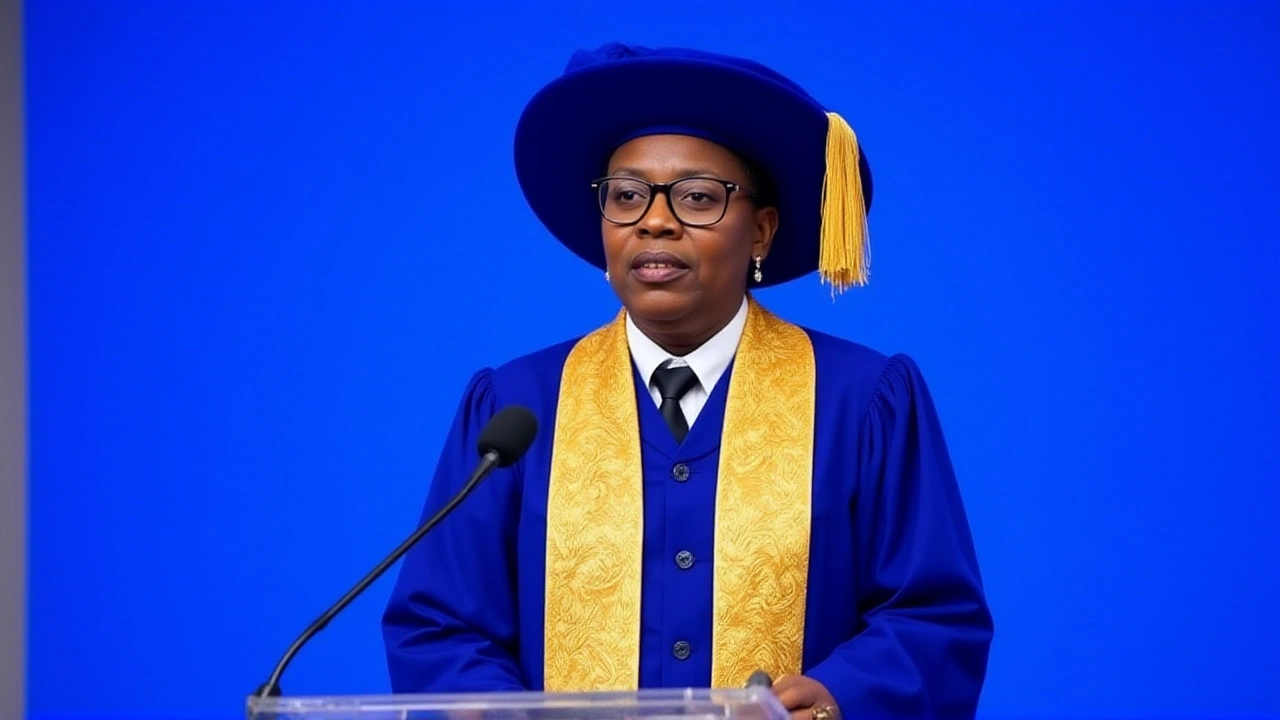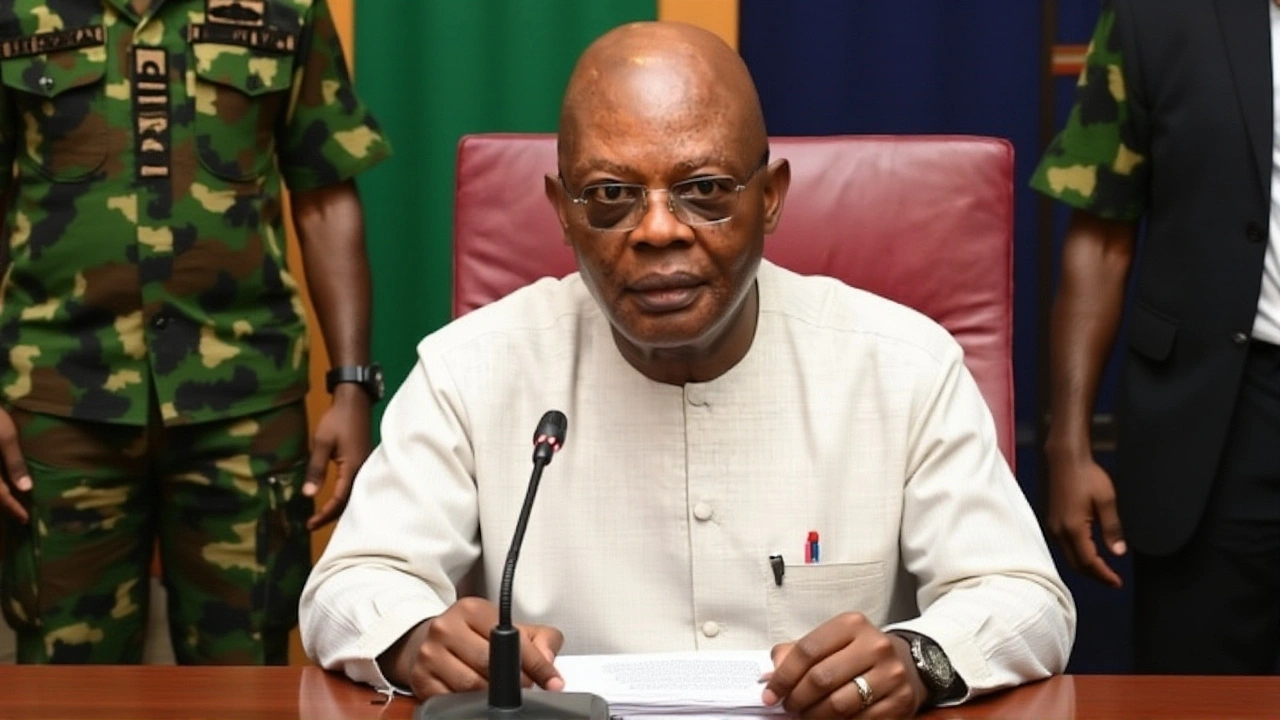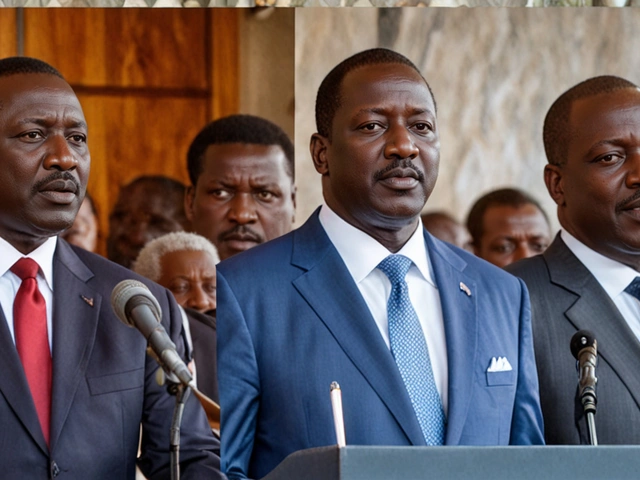When Vice Admiral Ibok‑Ete Ibas, retired former Chief of Naval Staff, was sworn in as the sole administrator of Rivers State on March 19, 2025, the political landscape shifted dramatically.
Backed by President Bola Ahmed Tinubu, who declared a state of emergency the day before, Ibas announced on the evening of March 26 that every political appointee of the suspended governor would be suspended effective immediately. The move targeted the Secretary to the State Government, the governor’s chief of staff, all commissioners, board chairpersons, special advisers, senior special assistants and dozens of directors across ministries.
Background to the Emergency Rule
The crisis that led to the federal intervention began in early 2025 when mounting reports of violent clashes between rival factions in the state legislature raised alarms in Abuja. The three‑man faction led by Victor Oko‑Jumbo claimed the legitimacy of the elected house, while the official Rivers State House of Assembly asserted its constitutional authority.
On March 18, after consulting the Minister of Interior and senior security chiefs, President Tinubu invoked Section 147 of the Nigerian Constitution, placing Rivers State under emergency rule for an initial six‑month period. The decree simultaneously suspended Governor Siminalayi Fubara, Deputy Governor Ngozi Odu, and all elected members of the state assembly.
That night, the president appointed Ibas as the sole administrator, granting him sweeping powers to restore law and order, re‑align state institutions, and oversee a transition back to civilian rule.
Ibas’ Sweep of Political Appointees
The suspension order, signed by Ibas’ chief of staff and released in a circular at Government House, Port Harcourt, stipulated that each suspended officer must hand over duties to the permanent secretary of their ministry. Where a permanent secretary was absent, the senior director or head of administration would assume the responsibilities.
In a swift administrative reshuffle, Ibas appointed Professor Ibibia Worika as the new Secretary to the State Government. During the swearing‑in ceremony, Ibas told Professor Worika to "bring his wealth of experience to bear in the governance of the state," emphasizing the need for technocratic competence amid the turmoil.
Observers noted the breadth of the suspension: 24 commissioners, 12 board chairpersons, 30 special advisers, and over 70 senior officials were affected. The move effectively emptied the governor’s cabinet, leaving Ibas as the sole authority to direct policy until the emergency expired on September 18, 2025.
Reactions and Legal Challenges
The abrupt purge sparked a chorus of reactions. Civil society groups warned that the blanket suspension could undermine institutional memory and delay service delivery. The Nigerian Bar Association filed a petition contending that the president’s emergency powers, while constitutionally valid, should not be used to overturn appointments made by a democratically elected governor without clear evidence of wrongdoing.
Meanwhile, the suspended officials were ordered to report to the permanent secretaries within 48 hours. Many complied, filing handover reports that highlighted pending projects in the oil and gas sector, education, and health. The handover process, however, was hampered by a shortage of senior civil servants—an issue Ibas acknowledged in a press briefing, promising to fast‑track temporary assignments.
The Supreme Court of Nigeria eventually weighed in on the broader Rivers crisis. In a landmark judgment delivered on August 30, 2025, the court declared the three‑man factional assembly led by Victor Oko‑Jumbo unlawful and affirmed the legitimacy of the original elected assembly (now suspended). The ruling also addressed the legality of the emergency decree, stating that while the president acted within constitutional bounds, the subsequent administrative actions must respect due process.
After the Emergency: Dismissals and Future Outlook
When the emergency rule lifted on September 18, the state returned to Governor Fubara’s control, but the political fallout lingered. At the first sitting of the reinstated Rivers State House of Assembly, legislators called on the governor to submit a fresh list of commissioner nominees for screening, alongside the 2025 state budget.
In a surprise move timed with Nigeria’s 65th Independence Day celebrations on October 1, 2025, Governor Fubara announced the permanent dismissal of all commissioners and public officers whose appointments were linked to the Supreme Court judgment. The statement, issued by his chief press secretary Nelson Chukwudi, read: "The Governor has relieved all Commissioners and other public officers affected by the recent Supreme Court judgment of their appointments with immediate effect."
During a valedictory session at Government House, Port Harcourt, Governor Fubara thanked the outgoing cabinet for their contributions over the past two years and pledged to rebuild the administration with renewed vigor. He called on Nigerians to collaborate with President Tinubu to foster a peaceful, secure, and prosperous nation.
The October dismissals closed a tumultuous seven‑month chapter that began with the federal emergency declaration. While the legal battles are largely settled, the state still faces the practical challenge of filling the vacated posts, ensuring continuity of essential services, and restoring public confidence.
Historical Context of Rivers State Crises
Rivers State has long been a flashpoint in Nigeria’s oil‑rich Niger Delta, with periodic clashes over resource control, environmental degradation, and political patronage. The 2007 and 2015 crises, both sparked by disputed elections and militia activity, resulted in federal interventions and temporary administrators.
The 2025 emergency echoes those earlier episodes but is distinguished by its swift legal resolution and the unprecedented scale of the administrative suspension. Analysts argue that the crisis underscores the fragility of the state’s political institutions and the need for robust civilian oversight mechanisms.
Looking ahead, the governor’s next steps will likely involve appointing interim commissioners, conducting a transparent screening process in line with the Constitution, and prioritizing infrastructure projects stalled during the emergency. International investors are watching closely, as stability in Rivers State directly impacts Nigeria’s oil export capacity.

Frequently Asked Questions
Why did President Tinubu declare a state of emergency in Rivers State?
The president acted after intelligence reports highlighted escalating violence between rival legislative factions, threats to oil infrastructure, and a breakdown of law‑and‑order, all of which jeopardized national security and revenue.
What authority allowed Ibas to suspend all of Governor Fubara’s appointees?
Under the emergency decree issued by President Tinubu, the sole administrator was granted full executive powers, including the ability to remove or suspend any political office holder to restore governance.
How did the Supreme Court ruling affect the dismissed officials?
The court declared the factional assembly unlawful and clarified that appointments made during the crisis were invalid, prompting Governor Fubara to permanently dismiss those officials in October 2025.
What are the immediate challenges facing the new administration?
Filling the dozens of vacant commissioner and advisory posts, ensuring uninterrupted delivery of health, education, and oil‑sector services, and rebuilding public trust after months of uncertainty are top priorities.
Will there be another federal intervention in Rivers State?
While the Supreme Court ruling has settled the legal disputes, any resurgence of violence or constitutional breach could prompt the federal government to consider another emergency, though officials say they prefer state‑led solutions this time.







Comments
Janette Cybulski
Wow, that whole emergency takeover was a massive shake‑up. I can only imagine the stress on the civil servants who had to hand over overnight. It's good that the Supreme Court finally stepped in and gave some clarity. Hopefully the new appointments bring some stability back to Rivers State.
Mildred Alonzo
the swift suspension was necessary but it left a big gap in governance
Elizabeth Bennett
We need to recognize that the president acted within his constitutional powers, yet the blanket removal of officials risked eroding institutional memory. The key now is transparent screening for new commissioners so that governance can resume effectively. Any process that sidesteps due process will only fuel further distrust.
linda menuhin
lol that admin move was wild lol bet the staff were like "what just happened?"
Jeff Abbott
Honestly, this whole saga exposed how fragile our political system really is. The emergency decree felt like a power grab, and the subsequent purges only deepened the crisis. It's a textbook case of overreaching authority.
Quinton Merrill
🔥 The emergency was intense, but the real challenge is rebuilding the bureaucracy. 🤔 We need skilled technocrats, not just political loyalists. 🌍 Let's watch how the next appointments shape the state's future.
Linda Lawton
It's clear the elite are pulling strings behind the scenes, using the emergency as a smokescreen to reset power balances. They probably want to install their own people before any real accountability. Stay alert, folks.
Ashley Bradley
When we examine the philosophical underpinnings of state authority, we see that legitimacy stems from both legal frameworks and popular consent. The emergency decree, while legally sanctioned, strained the social contract that binds a government to its citizens. This tension highlights the delicate balance between security and liberty. Moreover, the rapid suspension of officials disrupted the continuity of policy implementation, creating a vacuum that could be filled by opportunistic actors. In the long run, such abrupt interventions risk eroding public trust, which is essential for effective governance.
Joe Delaney
Sure thing.
Ruben Vilas Boas
Hey all, glad to see the discussion heating up. The key takeaway is that we need transparent criteria for the next wave of appointments. If we keep it fair, the state can bounce back stronger.
George Thomas
The situation underscores the importance of constitutional safeguards and the role of the judiciary in mediating crises.
Michelle Linscomb
That emergency definitely set a precedent, but we can't let the rhetoric turn into endless cycles of intervention. The people deserve stability over political theater.
John McDonald
From a strategic management perspective, the deployment of crisis mapping tools during the emergency could have optimized resource allocation. Leveraging data analytics would have mitigated the abrupt disruption we witnessed.
Jordyn Wade
First, the abrupt dismissal of so many officials created an administrative vacuum that threatened essential services across health, education, and the oil sector. Second, the handover process was hampered by a shortage of experienced civil servants, which slowed project continuity. Third, local businesses expressed concerns about policy uncertainty affecting investment decisions. Fourth, community leaders voiced fears that essential infrastructure projects could stall indefinitely. Fifth, the federal government pledged temporary assignments, yet the timeline remained vague. Sixth, the Supreme Court's ruling added a legal layer that required compliance from both state and federal actors. Seventh, the reinstated governor now faces the daunting task of rebuilding a functional cabinet from scratch. Eighth, transparent recruitment processes are critical to restore public confidence. Ninth, civil society groups have called for independent oversight to ensure merit‑based appointments. Tenth, international observers are monitoring the situation closely due to its impact on Nigeria’s oil exports. Eleventh, the media coverage has highlighted both the political intrigue and the human element of displaced workers. Twelfth, many suspended officials are seeking legal redress for loss of income and reputation. Thirteenth, the fiscal implications of re‑staffing the ministries could strain the state budget. Fourteenth, there is a growing call for capacity‑building programs to develop a new cadre of technocrats. Fifteenth, the overall stability of the Niger Delta hinges on how swiftly and effectively these transitions are managed. Finally, sustained dialogue among federal, state, and community stakeholders will be essential to prevent future crises.
Zoe Birnbaum
Wow, that’s a thorough breakdown! I think the emphasis on capacity‑building is especially spot‑on, we need fresh talent not just recycled politicos.
Amber Brewer
In practice, the screening panels should include representatives from the judiciary, civil society, and the private sector to ensure balanced vetting. This multi‑stakeholder approach can help mitigate bias.